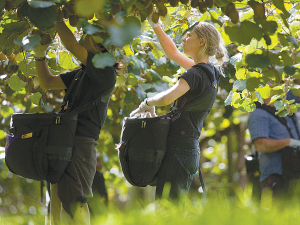Record Kiwifruit Crop 2025-26: Zespri Forecasts Highest Grower Returns
Good news for kiwifruit growers - a record crop with forecast per hectare returns at record levels for all fruit categories for the 2025-26 season.
 Zespri says there are several contributing factors to the decline in fruit quality, but the drastic lack of skilled people to harvest and pack kiwifruit has been a key factor.
Zespri says there are several contributing factors to the decline in fruit quality, but the drastic lack of skilled people to harvest and pack kiwifruit has been a key factor.
Zespri is in the midst of a major and hastily convened review to find out about the sudden drop in the quality of SunGold kiwifruit during the past season.
Chief executive Dan Mathieson told Rural News the fruit quality in the past season is the worst he's seen in a couple of decades. He says others in the sector, who've seen the product in oversas markets, have told them it's the worst they've seen.
Meanwhile, Zespri has heard comments from customers of fruit being soft and in some cases damaged.
"Our customers are saying, 'Hey Zespri - this fruit is not up to your normal standard' and our job now is to fix the problem," Mathieson says.
He says there are a number of contributing factors to the decline in fruit quality.
At the core of this is the drastic lack of skilled people caused by the Covid pandemic. Mathieson says the industry has struggled to get workers - both RSEs and backpackers - because of the border closures. There were no backpackers in NZ in 2022.
"We had a small remaining population of them in 2021, but by the time we got to 2022 there was none."
Mathieson told Rural News that the problem is not only having enough people to pick the crop; the problems started when the growers were setting up the crop because they lacked the staff to prune the vines and do all the other preparatory work, then not having the staff to get the crop of the vines in good condition. He says, in the past season, there has been a lot of pickign damage with scuffs and nicks on the fruit as well as during post-harvest and cool storage and then in transit.
"It's developing into rots and other things on the fruit and that is very serious. While there has always been seasonal variability, this year the variability has been much greater than what we have seen," he adds. "Handling is an issue and kiwifruit is a very sensitive fruit where a little nick can cause big damageon a piece of kiwifruti. It has to be handled well right through from orchard to consumer."
Aside from all the problems with harvesting kiwifruit in the past season, Mathieson believes there's been a gradual decline in fruit quality over the last few years, mainly due to it getting softer. He says, Chile - which also grows kiwifruit - has been experiencing the same problem and climate change or weather events are also likely factors. He says the weather events certainly haven't helped.
Mathieson adds that the general staff shortage was compounded by the rise in Covid cases, which saw absenteeism rates skyrocket.
He says some of the problems could be attributed to growing practices, where growers are focusing on how to maximise yield in their orchards - potentially at the expense of quality.
The Review
Mathieson says the good news is that despite the quality problems there is still a lot of good fruit getting through to market.
He says there is strong customer demand and Zespri's price position for SunGold is holding in market, which is very positive.
"Customers want more of our product but we have to go back now and make sure we have really good quality fruit consistently, like we did prior to Covid."
The review is already underway and Mathieson says it will be wide ranging and examine every possibility.
He says growers at the Zespri AGM endorsed the review and many acknowledged that they needed to do better. He says growers realise the importance and value of the brand and want to protect this. Mathieson told Rural News the hope for the 2023 season is that there will be more RSE workers and in general people available to work in the industry.
A New Zealand agribusiness helping to turn a long-standing animal welfare and waste issue into a high-value protein stream has won the Australian dairy sector's top innovator award.
Dairy Women's Network (DWN) has announced that Taranaki dairy farmer Nicola Bryant will join its Trust Board as an Associate Trustee.
Rural Women New Zealand (RWNZ) says it welcomes the release of a new report into pay equity.
Red meat exports to key quota markets enjoyed $1.4 billion in tariff savings in the 2024-25 financial year.
Remediation NZ (RNZ) has been fined more than $71,000 for discharging offensive odours described by neighbours as smelling like ‘faecal and pig effluent’ from its compositing site near Uruti in North Taranaki.

OPINION: A mate of yours truly reckons rural Manawatu families are the latest to suffer under what he calls the…
OPINION: If old Winston Peters thinks building trade relations with new nations, such as India, isn't a necessary investment in…